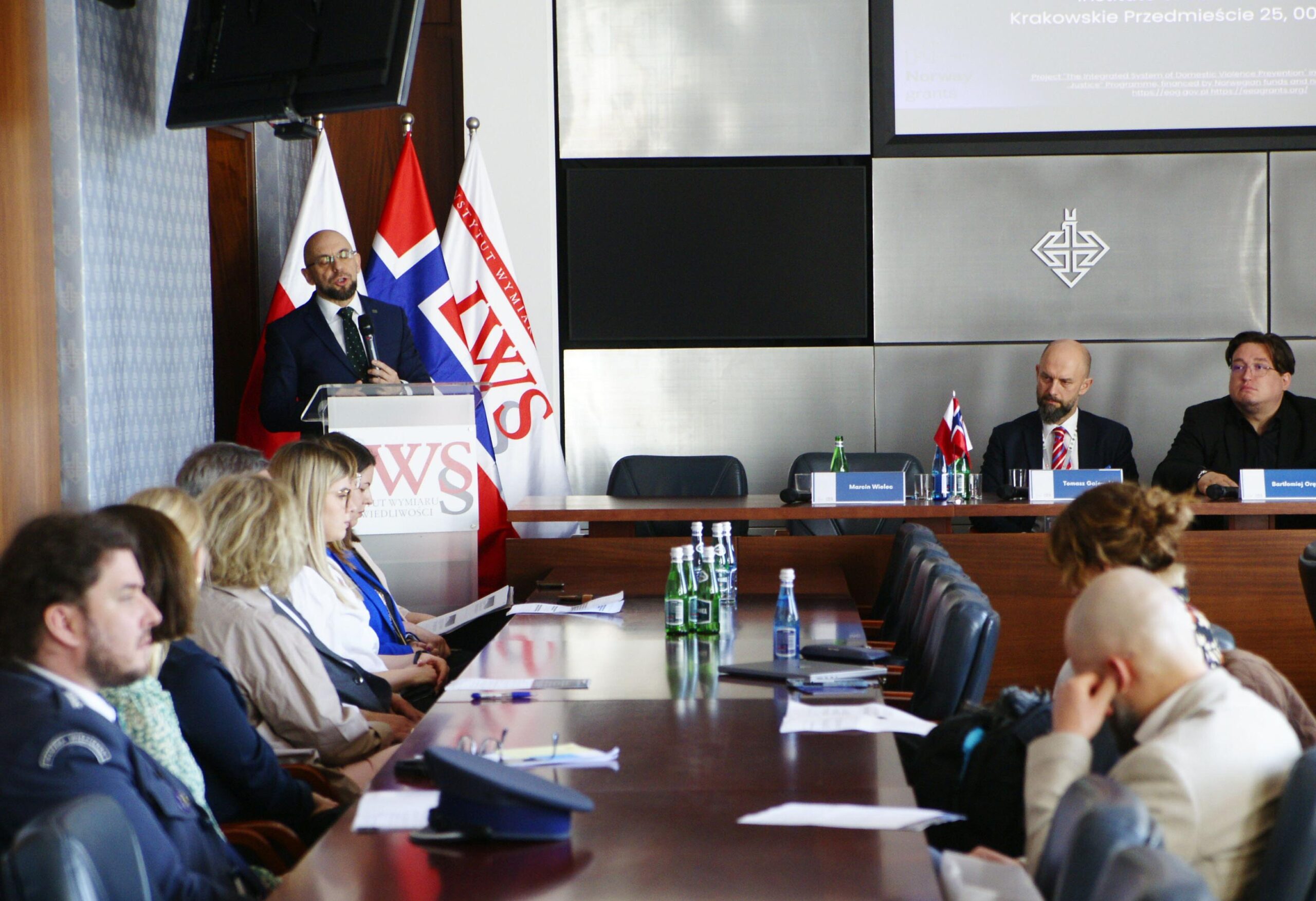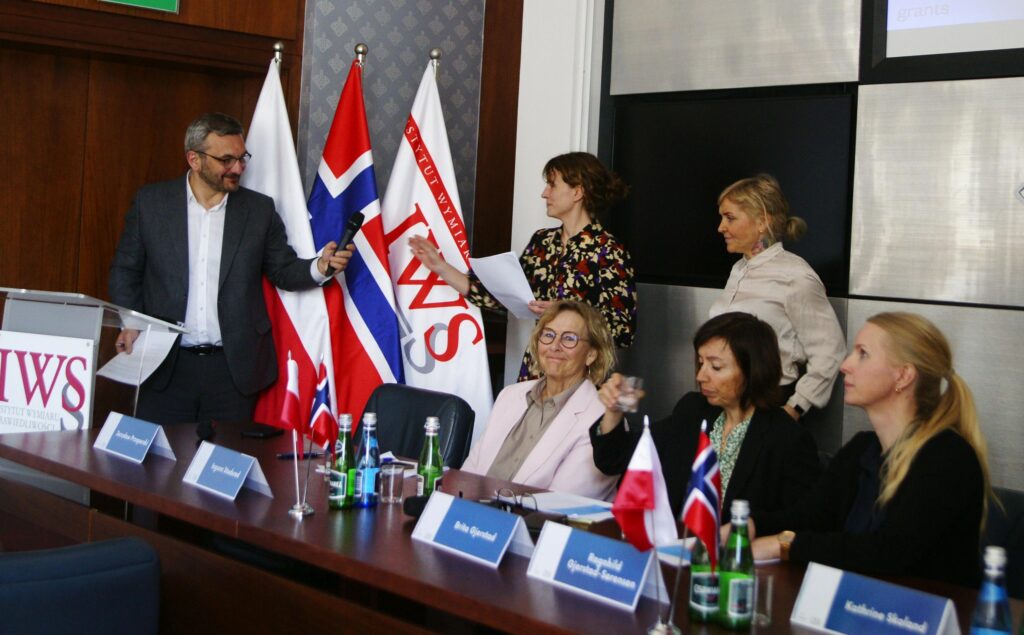Systemic Prevention of Violence
2024-04-23

Poland needs an integrated system for preventing domestic violence. “Our Polish-Norwegian research shows that we can act more effectively and systematically to address cases that unfortunately often end up in court, by eliminating the violence before it occurs,” said Prof. Marcin Wielec, Director of the Institute of Justice.
A two-day international scientific conference was held in Warsaw, marking the culmination of four years of work within the Polish-Norwegian research project. The aim was to create a model for violence prevention, test it in selected municipalities, and then implement it on a nationwide scale. “Some of the knowledge we gained through international cooperation has already been utilized in developing the anti-violence law known as ‘Lex Kamilka,’ which has recently come into force in the Polish legal system,” said Prof. Marcin Wielec.
The Institute of Justice was involved in the work on the “Lex Kamilka” law, and the experiences from international cooperation and research projects in Polish municipalities have already been put into practice. “Creating new laws should be preceded by research in the area the new legislation addresses. Seriously conducted legislation should be secondary, i.e., the result of research projects,” added Prof. Wielec.
Polish-Norwegian Cooperation
The aim of the international conference organized by the Institute of Justice is to increase public awareness of the phenomenon of domestic violence. “The best way to solve this problem is to prevent it, not just respond to its effects. Therefore, it is important to increase vigilance not only when families are directly threatened by domestic violence but also when they are not yet experiencing it,” said Dr. Bartłomiej Oręziak, coordinator of the Center for Strategic Analysis at the Institute of Justice and project manager of the Integrated System for Domestic Violence Prevention.
On the first day, April 11, 2024, at the English-language conference “The Integrated System of Domestic Violence Prevention,” scientists from Poland and Norway spoke, presenting domestic violence prevention systems in both countries. “Thank you all for organizing this event and for cooperating with us on the project, both the Institute of Justice and our researchers from Norway,” said Prof. Ingunn Studsrød from the University of Stavanger. During the conference, she presented research based on interviews with women trying to rebuild their lives. “Physical, psychological, emotional, and economic violence can have serious short-term and long-term effects on physical and mental health, such as injuries, depression, and anxiety,” said Prof. Ingunn Studsrød.
Testing in Municipalities
The next day, April 12, a nationwide scientific conference on the “Legal Aspects of Preventing Domestic Violence” was held. Scientists presented the model for preventing domestic violence developed during the project and cooperation with municipalities in its implementation. “Poland lacks effective systemic solutions for preventing family violence. A key element of the project was to develop an integrated system for preventing domestic violence that could be implemented on a wider scale after the test phase in selected municipalities,” said Dr. Bartłomiej Oręziak.

The project was tested in 14 selected municipalities across Poland, including small rural municipalities, rural-urban municipalities, and the large city of Krakow. For example, in the Dzierżoniów municipality (Lower Silesia), which participated in the project, the number of reports of health and life threats in 2023 compared to 2022 increased by 100% from 70 reports to 141. The number of people at risk of family violence using support services was 363, representing 182% of the planned value. The counseling and prevention point served 127 people, representing 114% of the planned value, and 151 people attended workshops on building positive family relationships and controlling emotions, representing 151% of the planned value.
During the project’s implementation, work was done not only with married and partnered individuals but also with single parents, youth, and educational activities were conducted on relationships for children and youth, in cooperation with schools, maintaining free forms of assistance.
The Key is Prevention
As part of the project, a guide for local government units on preventing domestic violence was created, as well as a set of court documents. “We also plan to publish a monograph dedicated to preventing family violence from a legislative perspective. The aim of the scientific monograph is to analyze selected legal aspects of the integrated system for preventing family violence along with the current state of case law and the position of legal scholars,” emphasized Dr. Oręziak.
Conference participants pointed out that the best way to solve the phenomenon of domestic violence is prevention, not just reacting to its effects. Therefore, it is very important to increase vigilance not only at the stage when families are in immediate danger of domestic violence but much earlier. In this context, local-level activities should be organized to provide comprehensive help and support to families threatened by domestic violence. “The key is prevention, so we must make every effort to reach environments where domestic violence is most frequent. The integrated system involves coordination and cooperation among many entities and institutions. Therefore, we need coordinated actions by social workers, schools, educators, and sociologists,” explained Prof. Marcin Wielec.
The “Integrated System for Domestic Violence Prevention” project is implemented under the “Justice” program funded by Norwegian funds and national funds. The research project is carried out by the Institute of Justice in cooperation with the University of Stavanger in Norway.

































